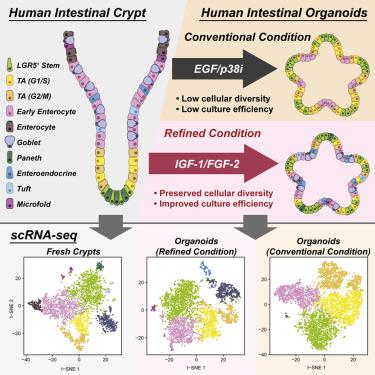当前位置:
X-MOL 学术
›
Cell Stem Cell
›
论文详情
Our official English website, www.x-mol.net, welcomes your
feedback! (Note: you will need to create a separate account there.)
Human Intestinal Organoids Maintain Self-Renewal Capacity and Cellular Diversity in Niche-Inspired Culture Condition.
Cell Stem Cell ( IF 19.8 ) Pub Date : 2018-Dec-06 , DOI: 10.1016/j.stem.2018.11.016 Masayuki Fujii , Mami Matano , Kohta Toshimitsu , Ai Takano , Yohei Mikami , Shingo Nishikori , Shinya Sugimoto , Toshiro Sato
Cell Stem Cell ( IF 19.8 ) Pub Date : 2018-Dec-06 , DOI: 10.1016/j.stem.2018.11.016 Masayuki Fujii , Mami Matano , Kohta Toshimitsu , Ai Takano , Yohei Mikami , Shingo Nishikori , Shinya Sugimoto , Toshiro Sato

|
Cellular diversity that shapes tissue architecture and function is governed by multiple niche signals. Nonetheless, maintaining cellular diversity in human intestinal organoids has been challenging. Based on niche ligands present in the natural stem cell milieu, we establish a refined organoid culture condition for intestinal epithelia that allows human intestinal organoids to concurrently undergo multi-differentiation and self-renewal. High-throughput screening reveals that the combination of insulin-like growth factor 1 (IGF-1) and fibroblast growth factor 2 (FGF-2) enhances the clonogenic capacity and CRISPR-genome engineering efficiency of human intestinal stem cells. The combination equally enables long-term culture of a range of intestinal organoids, including rat small intestinal organoids. Droplet-based single-cell RNA sequencing further illustrates the conservation of the native cellular diversity in human small intestinal organoids cultured with the refined condition. The modified culture protocol outperforms the conventional method and offers a viable strategy for modeling human intestinal tissues and diseases in an in vivo relevant context.
中文翻译:

在小生境启发的培养条件下,人类肠道类固醇维持自我更新能力和细胞多样性。
决定组织结构和功能的细胞多样性是由多种利基信号控制的。尽管如此,维持人类肠道类器官中的细胞多样性一直是一项挑战。基于天然干细胞环境中存在的利基配体,我们为肠上皮细胞建立了一个完善的类器官培养条件,该条件允许人类肠类器官同时发生多分化和自我更新。高通量筛选显示胰岛素样生长因子1(IGF-1)和成纤维细胞生长因子2(FGF-2)的组合可增强人肠干细胞的克隆形成能力和CRISPR基因组工程效率。这种组合同样可以长期培养多种肠道类器官,包括大鼠小肠类器官。基于液滴的单细胞RNA测序进一步说明了在经过改良条件培养的人小肠类器官中天然细胞多样性的保守性。改进的培养方案优于常规方法,并提供了在体内相关情况下对人体肠道组织和疾病建模的可行策略。
更新日期:2018-12-07
中文翻译:

在小生境启发的培养条件下,人类肠道类固醇维持自我更新能力和细胞多样性。
决定组织结构和功能的细胞多样性是由多种利基信号控制的。尽管如此,维持人类肠道类器官中的细胞多样性一直是一项挑战。基于天然干细胞环境中存在的利基配体,我们为肠上皮细胞建立了一个完善的类器官培养条件,该条件允许人类肠类器官同时发生多分化和自我更新。高通量筛选显示胰岛素样生长因子1(IGF-1)和成纤维细胞生长因子2(FGF-2)的组合可增强人肠干细胞的克隆形成能力和CRISPR基因组工程效率。这种组合同样可以长期培养多种肠道类器官,包括大鼠小肠类器官。基于液滴的单细胞RNA测序进一步说明了在经过改良条件培养的人小肠类器官中天然细胞多样性的保守性。改进的培养方案优于常规方法,并提供了在体内相关情况下对人体肠道组织和疾病建模的可行策略。











































 京公网安备 11010802027423号
京公网安备 11010802027423号